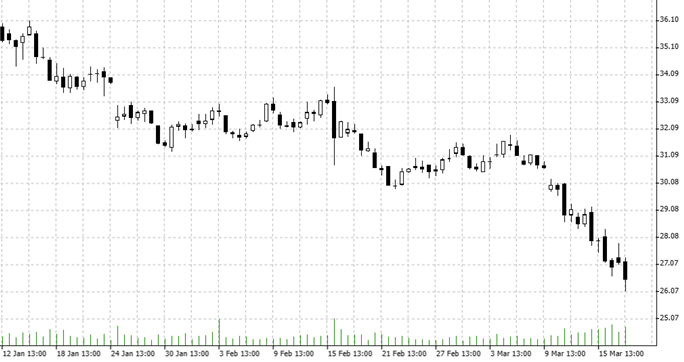

20.03.2023 – Are these now the firebreaks that will stop the spread of the wildfire? The Federal Reserve, the European Central Bank and four other major central banks are stepping up the supply of liquidity to banks. We are curious to see if investors will take this as reassurance, or if they will take the action as a sign of panic. In addition, UBS will buy Credit Suisse.
Recent events have not yet had a positive impact on PKO Bank Polski, for example, here is the four-hour chart. The sell-off is surprising, because on the one hand the bank is actually a savings bank with hundreds of branches and many solid workers as customers. That is also the name: Powszechna Kasa Oszczędności Bank Państwowy (“General Savings Bank – State Bank”). So probably only a few risky loans. Note: The flipped regional banks in the US were heavily involved in crypto business and biotech or high-tech startups. Moreover, Poland’s largest bank is about one-third state-owned. And savers could hardly ask for greater security.

Source: Bernstein Bank GmbH
But in these times, facts tend to be ignored. And in a crisis, the water level falls for everyone. Ergo, monetary guardians must act quickly. As predicted last week, the masters of money have now decided to intervene. Six major central banks are stepping up the supply of greenbacks: From now on, there will be daily dollar swaps instead of weekly ones as before. The transactions have a term of seven days each and are to take place until at least the end of April. This was announced yesterday evening, in addition to the Fed and the ECB, the central banks of Canada, Great Britain, Japan and Switzerland.
The whole program of the financial cavalry
The financial blog “ZeroHedge” commented that the Fed was panicking. Now that the swap lines have been reopened, the rest of the cavalry will follow: Rate cuts, quantitative easing, and an increase in the inflation target from 2 to 3 percent. The market is back in liquidity injection mode – the Fed has decided to restore confidence in the banks, he said. However, confidence in the fight against inflation has been destroyed, he said.
UBS swallows Credit Suisse
Meanwhile, major Swiss bank UBS will acquire failed rival Credit Suisse for 3 billion francs. The Swiss National Bank is backing the takeover with up to 100 billion francs. This is the most significant bank merger in Europe since the 2008 financial crisis, and we think: We will probably see more buyouts in the sector.
Our conclusion: We are not sure if investors are convinced of all these moves yet. Probably swap lines are too abstract for many. Perhaps the bulls won’t pick up until the last of the weak banks are gone. Presumably, only an official break from the cycle of tightening in the U.S. and Europe will remove the fear. We can also well imagine a government entry into wobbling commercial banks. And then many stable institutions, whose share price has been beaten down in the clan, will suddenly be insanely attractive buying opportunities again. Whether long or short – we wish you good nerves and successful trades in these interesting times!
___________________________________________________________________________________________________________________________________________
The content of this publication is for general information purposes only. In this context, it is neither an individual investment recommendation or advice nor an offer to purchase or sell securities or other financial products. The content in question and all the information contained therein do not in any way replace individual investor- or investment-oriented advice. No reliable forecast or indication for the future is possible with respect to any presentation or information on the present or past performance of the relevant underlying assets. All information and data presented in this publication are based on reliable sources. However, Bernstein Bank does not guarantee that the information and data contained in this publication is up-to-date, correct and complete. Securities traded on the financial markets are subject to price fluctuations. A contract for difference (CFD) is also a financial instrument with leverage effect. Against this backdrop, CFD trading involves a high risk up to the point of total loss and may not be suitable for all investors. Therefore, make sure that you have fully understood all the correlating risks. If necessary, ask for independent advice. CFDs are complex instruments and are associated with the high risk of losing money quickly because of the leverage effect. 68% of retail investor accounts lose money trading CFD with this provider. You should consider whether you understand how CFD work and whether you can afford to take the high risk of losing your money.7
